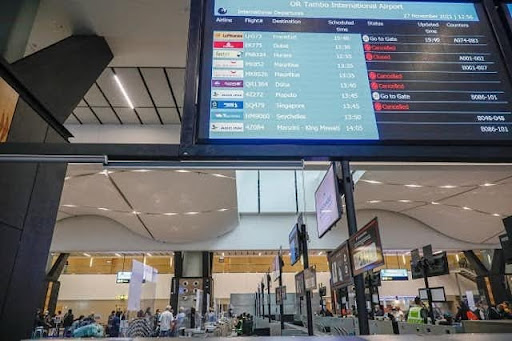‘Stop Singling Out Africa’: Reactions Over Unfair Treatment Of Southern African Countries
Experts say the discovery of the Omicron variant in southern Africa is the result of vaccine inequality and vaccine hoarding by rich countries.

A wave of resentment has followed travel restrictions imposed on Southern Africa by wealthier countries after the emergence of a heavily mutated coronavirus variant named Omicron in the region.
On Thursday, Nov. 25, scientists in South Africa, said they detected the new variant, first known as B.1.1.529 and later named Omicron. The following day, the World Health Organisation (WHO) designated Omicron as a “variant of concern.”
The country reported a surge in infections with the positivity rate jumping from the seven-day average of 4.3% to 9.1%.
The news spurred wealthier countries into banning travellers from the Southern Africa region, dimming economic prospects of the end-of-the-year holiday season.
Sthembiso Dlamini, South Africa’s acting Tourism CEO, said the travel ban was unjust and rushed, one that would further derail recovery efforts in the tourism sector.
The South African government said the country was being “punished” for its advanced ability to detect new mutations early.
Ayoade Alakija, a co-chair of the Africa Vaccine Delivery Alliance, said vaccine inequality might have spurred the emergence of the new variant.
According to Alakija, Africa is facing the consequences of a rushed response from Western nations, which had failed to deliver vaccines and resources to the region.
“What is going on now is inevitable. It’s as a result of the world’s failure to vaccinate in an equitable, urgent and speedy manner,” Alakija said in a BBC interview on Sunday, Nov. 28.
“It’s as a result of vaccine hoarding by rich countries. The travel bans are based on politics, not on science. It’s wrong.”
“Botswana is where the variant was first identified. The Botswana government had ordered 500,000 Moderna vaccines at $29 per dose, much higher than what the rest of the world paid. ”
“Guess what? They didn’t get those vaccines because other countries jumped the queue. Moderna supplied to other countries and didn’t supply to Botswana. So now, we have a new variant.”
She said locking out Africa as a result of the emergence of a new variant is discriminatory and xenophobic, citing how the world had reacted differently when the first variant of coronavirus was first discovered in Wuhan, China in 2020.
“If coronavirus was first discovered in Africa, it is now clear that the world would have locked us out and thrown the key away,” she said.
“There would have been no urgency to develop a vaccine; it would have been expendable. Africa would have become known as the continent of Covid-19.”
“Do we know where this variant originated from? No, we don’t even know that yet. It could be that the excellent science in South Africa has shown it up or it could very well have come from anywhere else. What we can say about this variant is that we don’t know. Until everyone is vaccinated, no one is safe. But what exactly is the global playbook on this? Are we just going to act politically?”
“No one is locking out Belgium and Israel. Why are we locking away Africa?”
She said it was time for African leaders to rise against the discriminatory measures and not to treat them “as business as usual.”
“The continent is at stake, our lives are at stake and we cannot allow them to do this to us. Something needs to be done.”
Akinwumi Adesina, president of the African Development Bank (AfDB), said there must be global justice, equity and fairness in access to vaccines.
“Protecting one’s home alone amid a forest fire does not work. Put out the forest fire,” Adesina tweeted on Sunday.
“Africa must accelerate the manufacturing of its vaccines and set up its own “healthcare security defence system.” Africa must no longer outsource the health security of its 1.8 billion people to the benevolence of others.”
Michael Ryan, Head of Emergencies at World Health Organisation (WHO) in South Africa, also stressed the importance of waiting to see what the data will show.
“We’ve seen in the past, the minute there’s any kind of mention of any kind of variation and everyone is closing borders and restricting travel. It’s really important that we remain open, and stay focused,” Ryan said.
Support Our Journalism
There are millions of ordinary people affected by conflict in Africa whose stories are missing in the mainstream media. HumAngle is determined to tell those challenging and under-reported stories, hoping that the people impacted by these conflicts will find the safety and security they deserve.
To ensure that we continue to provide public service coverage, we have a small favour to ask you. We want you to be part of our journalistic endeavour by contributing a token to us.
Your donation will further promote a robust, free, and independent media.
Donate HereStay Closer To The Stories That Matter




